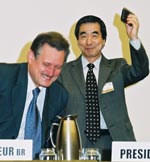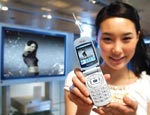| Home : ITU News magazine | ||||||||
In his opening remarks to the Assembly, ITU Secretary-General, Yoshio Utsumi, reminded delegates that “radiocommunication issues are becoming more and more complex and that diverse and technical solutions will require even more intuition and skill”. He cited as an example, the growing convergence between certain services for which the generic term “wireless access” is commonly used. Indeed, one of the themes that ran through the work of the Assembly concerned compatibility between systems and services. Yasuhiko Ito (Japan), who was acclaimed as Chairman of the Assembly, reinforced this theme by saying, “the environment in which ITU operates has changed dramatically in the past ten years due to the expansion of the Internet and wireless communications.” He believes this was reflected in the unprecedented number of items that the Assembly was to deal with. “We are being asked to move quickly. We must show evidence that we are aware of this request and respond accordingly.” Valery Timofeev, Director of the Radiocommunication Bureau, said that this Assembly marked a transition in the life of the Radiocommunication Sector and was a suitable opportunity to review the ITU–R Resolutions. These Resolutions are key to the work of the seven study groups. “It is important the Resolutions provide clear guidance upon which the study groups can pursue their activities, but without imposing unnecessary bureaucracy.” He added that the need to reach agreement on these “would be a clear demonstration of the continuing strength of the Sector, even when faced with increasingly complex scenarios”.
Working methodsA new feature has been incorporated into Resolution ITU–R1, which describes the working methods of ITU–R study groups. It offers a new method by which, under certain conditions, the process for the adoption and approval of ITU–R Recommendations may be applied simultaneously. This will shorten the time needed to approve a Recommendation. The Assembly decided to retain the existing Conference preparatory process by which the results of study groups are consolidated and presented to a world radiocommunication conference (WRC). This decision was influenced by the needs of developing countries in acknowledgement of the economic and human resource challenges they face in participating fully throughout the preparatory phase of a WRC. The important role of the Special Committee for regulatory/procedural matters was also recognized, and as a consequence this body is retained as a major feature of the WRC preparatory process. Approval of RecommendationsThe Assembly approved more than 30 Recommendations, most of which were needed at this year’s World Radiocommunication Conference (WRC-03), held in Geneva from 9 June to 4 July 2003. These Recommendations cover areas such as IMT-2000, digital broadcasting below 30 MHz, wireless local area networks (WLAN) and the protection of passive services such as the Earth-exploration satellite service and radio astronomy.
The reality of the increased convergence and complexity of radiocommunication services was recognized by the Assembly in its acceptance of a revised Resolution ITU–R 9, which concerns collaboration of ITU–R with other organizations. This is considered necessary for the progress and development of Recommendations in various fields such as broadcasting, personal mobile systems and WLANs. The newly revised Resolution will facilitate collaboration and dialogue with these organizations and provide greater flexibility in the use of their material. One of the Recommendations approved outlines the framework and overall objectives of the future development of IMT-2000 systems and systems beyond IMT-2000, including the need for services to appear as seamless and as common as possible from the user’s perspective. The Recommendation also calls for a review of user trends. It states that once mobile multimedia data services have been widely deployed and sufficient user experience is gained, such experience should be considered in re-evaluating the potential market requirements for future development. Such reviews of user trends are to be undertaken as required and reflected in the development of future revisions of the Recommendation. Global cooperation of various wireless research forums will be encouraged to make this research possible. |
||||||||
 Assembly spells out future direction of
ITU–R
Assembly spells out future direction of
ITU–R Yasuhiko Ito, Chairman of the Assembly, with Valery
Timofeev,
Director of the Radiocommunication Bureau, after receiving a silver medal from
ITU Secretary-General
Yasuhiko Ito, Chairman of the Assembly, with Valery
Timofeev,
Director of the Radiocommunication Bureau, after receiving a silver medal from
ITU Secretary-General
 A mobile phone with a colour television function.
This handset receives television broadcasts over public access channels
A mobile phone with a colour television function.
This handset receives television broadcasts over public access channels